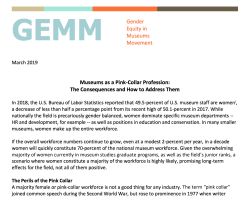Feeling Undervalued at Work? These Tips Will Help You Rebalance
Posted: October 28, 2019 Filed under: Leading Across Organizations, Museum, museum staff, Nonprofit Leadership, Work Habits, Workplace Values | Tags: Leadership, museums, nonprofit Leave a comment
This week I spent time with a consultant. She’s visited us before so we know her well. She’s wise and kind, but also direct. Her role is to provide us with a programatic review in preparation for hiring a new director in 2020. At one level it has a Fiddler on the Roof quality–you know, “Matchmaker, matchmaker make me a match, find me a find, catch me a catch–” but as with any possible hire, there’s a lot of behind-the-scenes preparation too.
Part of that work is to make sure we understand our job descriptions, and how they co-join, creating a strong program. In our conversation she pointed out something so simple I can’t believe I never thought about it. First, she said our job descriptions were empty, anemic things. Then she asked whether we felt valued. We hemmed and hawed, answering sort of and maybe. Bear in mind, there were only three of us in the room. We’re the happiest team members: we love our work; we work well together; we get stuff done, and yet, we struggled with this question. Then she tied the two ideas together, suggesting the former — our bland and formulaic job descriptions, coupled with a general miasma of misunderstanding over what we do and what we’re capable of — left us under-valued. Fortunately, we’re self-directed, confident, and like I said, happy, so the question of value hasn’t been a huge issue, and yet, once she drew our attention to it, it’s hard to un-see.
So all of you out there in museum land: What about your sense of value and self-worth? Who tells you you’re doing a good job? And when was the last time you read your job description? Was it just before your potentially useless annual review when you tried to figure out how far you strayed from the way your position was originally advertised?
As a leader you report to someone higher up even if it’s your board, and you certainly have people reporting to you. If you feel valued, and value those working for and with you, stop reading. If you’re not sure, before you eye roll and say something about leaders are not counselors and your employees’ self worth is their problem, think about this: hiring costs money as does training. People need value and meaning in their lives, and if they can’t find it in your museum, there may be a larger problem.
So if you’re a museum leader, consider the following:
- Make sure your goals and expectations are clear: Write them down and rank them. That way employees, especially front-line employees who are the museum’s public face, don’t have to choose between competing expectations.
- Build a culture that acknowledges good work: sometimes it’s a simple thank you; another day it’s cider doughnuts for the team; or maybe the salaried staff takes the hourly staff’s jobs for an afternoon for work well done. Find your own way to say what your staff does matters.
- Increase staff visibility: When you have the opportunity, toot your team’s horn. Talk about what they do and why it has value. And make sure everyone’s contribution is acknowledged at the completion of an exhibit, program or campaign.
- Consider what you can do: Workplace wellness is one of the top concerns cited in Mercer’s 2018 Global Talent Trends survey of for-profit businesses, not to mention the numerous articles and posts in museum-related publications. Think about instituting an on-site health screening, a wellness challenge, or a paid hour a week of wellness time for employees to use. If museum leadership puts wellness on the table, that permits everyone to be concerned. Working a 12-hour day isn’t an option because–oh, you’re valued–and you need time away to re-charge and re-group.
And if you’re a staff member who’s under-appreciated:
- Talk to your boss. Does she know what you’re doing outside the lines of your job description? Bring your list of recent accomplishments. Does your job description need editing based on what you’re doing?
- This isn’t kindergarten and getting a gold star won’t give your work meaning. That comes from you. Carve out time for personal reflection, daily or weekly or even monthly. What went well? What gave you satisfaction? Pat yourself on the back when you get a win.
- Are your skills wasted? Is there a gap between your job description and your talents? If yes, talk to your boss. Maybe it’s time to alter your job description.
- And if not, know when it’s time to move on. People who love their work and their job, find meaning and value in what they do almost every day. There are a billion reasons to tell yourself you can’t change jobs. Do you tell yourself you should quit, but somehow looking for another job always moves to the bottom of the list? Figure out why, and then move toward something new and better.
In a few weeks it will be Thanksgiving when we gather with friends and family to say a collective thank you. Don’t wait ’til then. In fact, don’t wait. Tell your colleagues, your staff, and your board when they matter. Let them know they’re valued. Who knows maybe next time they’ll return the favor?
Joan Baldwin









